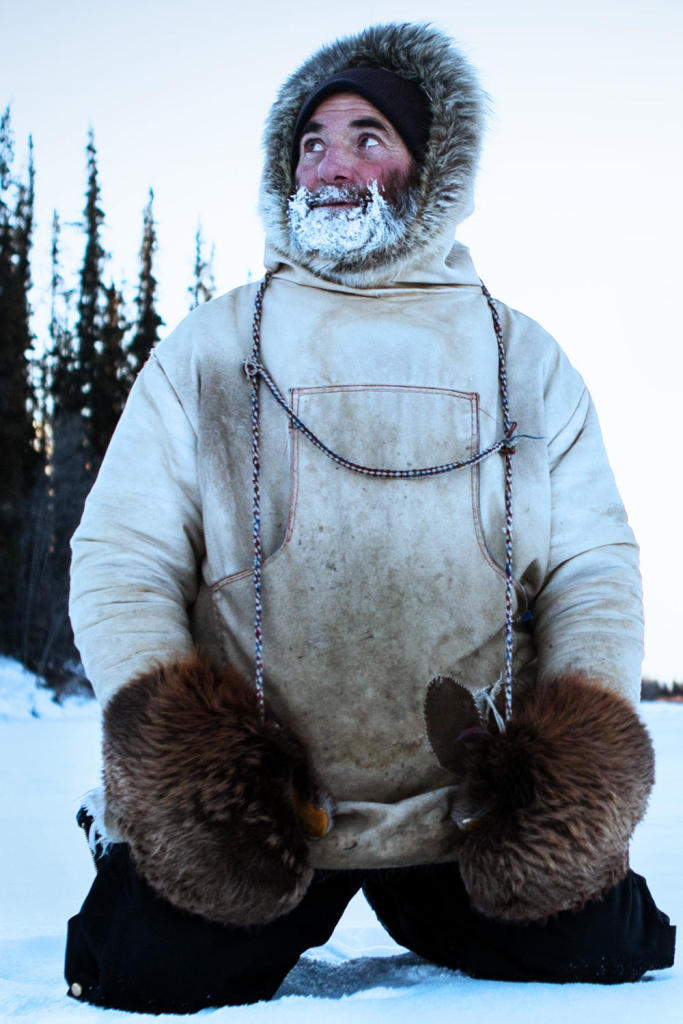In a political world stitched together
with alternative facts--damned lies, if you prefer--
it is authentic to watch, "The Last Alaskans", on the Discovery Channel.
It is the story of a handful of families in
the most northern and eastern corner of Alaska
who, when the Arctic National Wildlife Refuge
was formed, were granted the right to continue
to live there, to their grandchildren's generation.
It is impossible not to admire them as
human beings, even when absolutely nothing
in my being wants to be one of them.
Something there is in their incredible isolation--
hundreds of miles between them,
mountains of ice and flooded rivers
and unbounded spears of stubborn trees stretching forever--
that lets them be participants in
the long, stubborn way our species has come
to be where we are.
Last week, Mari and I drove to New Mexico,
our neighboring State to the east,
to see the Gila Cliff Dwelling where,
about 800 years ago, some of the first Americans--
who did not know they would come be be called that--
built a refuge for themselves
to protect themselves from whatever was out there,
which included other human beings.
It has not been easy
for the human species
to meet itself
coming over the horizon.
We are, after all, ourselves
descendants of savagery,
long back.
Strangers were dangers,
and families backed themselves
into refuges, not just to stay warm
but to stay alive.
 The Last Alaskans
The Last Alaskans
are to be admired but
not to be emulated.
The way forward
is to learn to live together,
even when, sometimes,
the urge comes to go far back,
almost alone.
We cannot become Last Alaskans.
They are a remainder,
a reminder of the way we came,
not the way we should go.
The Gila Cliff Dwellers lived in the cliff
for only about twenty years, and then
climate, or other human beings, drove them out.
We are everywhere.
There is nowhere where
we can run away.
But we try.
England has decided to withdraw from Europe.
We, having crafted a Constitution for living together,
a more perfect union from imperfect humans,
have decided to elect a Strong Man to lead us
who does not have a clue what to do,
but it seemed easier than imagining our own future.
"Let us build a wall," we said,
"and pull up the ladder."
Do the English really believe that they are not in Europe?
Do we really believe that we live on an island?
Should we dig a moat, and build a wall?
That is the way we came, not the way to go.
with alternative facts--damned lies, if you prefer--
it is authentic to watch, "The Last Alaskans", on the Discovery Channel.
It is the story of a handful of families in
the most northern and eastern corner of Alaska
who, when the Arctic National Wildlife Refuge
was formed, were granted the right to continue
to live there, to their grandchildren's generation.
It is impossible not to admire them as
human beings, even when absolutely nothing
in my being wants to be one of them.
Something there is in their incredible isolation--
hundreds of miles between them,
mountains of ice and flooded rivers
and unbounded spears of stubborn trees stretching forever--
that lets them be participants in
the long, stubborn way our species has come
to be where we are.
Last week, Mari and I drove to New Mexico,
our neighboring State to the east,
to see the Gila Cliff Dwelling where,
about 800 years ago, some of the first Americans--
who did not know they would come be be called that--
built a refuge for themselves
to protect themselves from whatever was out there,
which included other human beings.
It has not been easy
for the human species
to meet itself
coming over the horizon.
We are, after all, ourselves
descendants of savagery,
long back.
Strangers were dangers,
and families backed themselves
into refuges, not just to stay warm
but to stay alive.
 The Last Alaskans
The Last Alaskansare to be admired but
not to be emulated.
The way forward
is to learn to live together,
even when, sometimes,
the urge comes to go far back,
almost alone.
We cannot become Last Alaskans.
They are a remainder,
a reminder of the way we came,
not the way we should go.
The Gila Cliff Dwellers lived in the cliff
for only about twenty years, and then
climate, or other human beings, drove them out.
We are everywhere.
There is nowhere where
we can run away.
But we try.
England has decided to withdraw from Europe.
We, having crafted a Constitution for living together,
a more perfect union from imperfect humans,
have decided to elect a Strong Man to lead us
who does not have a clue what to do,
but it seemed easier than imagining our own future.
"Let us build a wall," we said,
"and pull up the ladder."
Do the English really believe that they are not in Europe?
Do we really believe that we live on an island?
Should we dig a moat, and build a wall?
That is the way we came, not the way to go.


Comments
Post a Comment